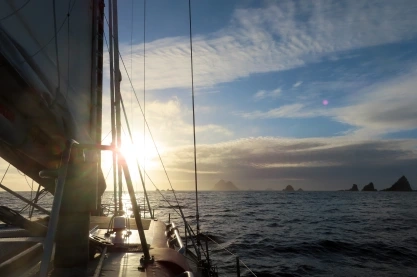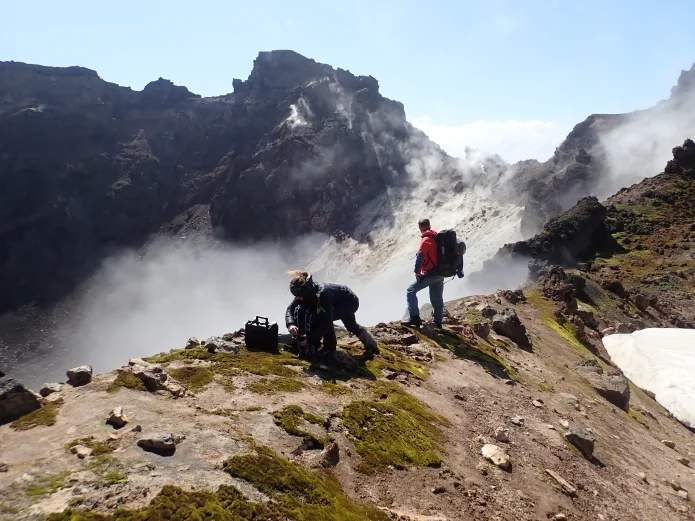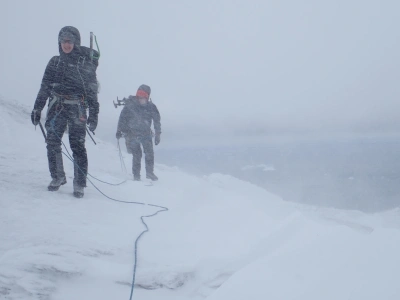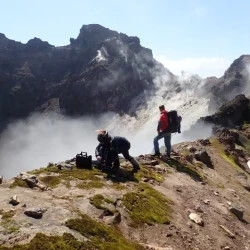Vismo used by Leading UCL Research Team at Remote Volcanoes
Craig Swallow

“We knew that at our furthest point we would be more than eight hundred miles from the nearest civilisation. Our closest neighbours were on the international space station! In such a situation, it is a great reassurance to have the ability to contact a support network in the event of an emergency” says Emma. “This is why we contacted Vismo”.



Craig Swallow
Satellite communication from Vismo supports research team working at some of the most remote volcanoes on Earth.
Mobile communication solutions are an essential part of any expedition planning, particularly for those teams or individuals heading to remote places. “As research takes scientists to ever more extreme environments, satellite-based solutions have revolutionised the support available to help them keep in contact” says Vismo, the global tracking solution company.
In January 2020, Dr Emma Liu, a Lecturer in Volcanology at the University College London, set sail on a five week ocean expedition to the South Sandwich Islands. Together with Dr Kieran Wood from the University of Bristol, their aim was to measure and sample the volcanic gases being emitted from this remote and unexplored chain of volcanoes in the Southern Ocean.
“We knew that at our furthest point we would be more than eight hundred miles from the nearest civilisation. Our closest neighbours were on the international space station! In such a situation, it is a great reassurance to have the ability to contact a support network in the event of an emergency” says Emma. “This is why we contacted Vismo”.
In addition to volcanological research, the multi-disciplinary expedition team aboard the Pelagic Australis sailing yacht included penguin ecologists, glaciologists, a whale biologist, an expedition medic and a media team. “The South Sandwich Islands have only been visited by a handful of scientists, and fewer still have attempted to land ashore. We were a strong team, with lots of experience on board, so this was a unique opportunity for inter-disciplinary science”, says Emma.
“During the expedition, I was working with Dr Tom Hart, University of Oxford, to explore the impact of volcanic activity on one of the largest known penguin colonies on Earth. A population census in 2012, prior to a large eruption in 2016, indicated several tens of thousands of Chinstrap and Adelie penguins on Saunders Island. We were interested to discover the impact of this eruption on the health of the colony, and how they have responded to persistent toxic volcanic gas emissions since.” Emma adds. “I was also fascinated to find out about the chemical composition of the volcanic gases being emitted into the atmosphere, and to assess the emission rate of major gases such as carbon dioxide”.
Emma had been supported by Vismo on a previous expedition to Ol Doinyo Lengai volcano, Tanzania (with PhD student Kate Laxton, also from UCL), where satellite communication had proved invaluable. Emma explains “We were able to seek medical advice from emergency services in the UK that set our mind at rest when one of the team fell ill. We also used Vismo’s continuous tracking facility, which updated our location every 20 minutes and could be viewed by our support team back at UCL. Given the success of communications during this expedition to Africa, my first port of call when I knew I was headed to somewhere even more remote was Vismo”.
Emma adds, “Vismo advisors suggested the Iridium Extreme satellite phone for my communication needs. The hardware support I received from Vismo was second to none. They set up all the hardware and arranged the call plan leaving me free to concentrate on preparing the scientific equipment”.
In addition to emergency comms, Emma and her team found satellite communication to be essential on a day to day basis. “We would land ashore each morning and hike far up the volcano to make our measurements. Although equipped with VHF radios to contact the sailing vessel and other teams ashore, the mountainous terrain meant we would often go out of line of sight making radio contact difficult. In this situation, the satellite phone provided by Vismo allowed us to check in from wherever we were, and to provide logistical updates to the team when needed. I never left the boat with my satellite phone” says Emma.
Later in the expedition, when weather conditions caused plans to change, the research team used satellite communication to contact the Government of South Georgia and the South Sandwich Islands to request last minute changes to their research permits, which were granted. Emma explains, “These last minute alterations to our permits allowed us to collect additional samples that would otherwise not have been possible. In the field you need to be very flexible and ready to change plans in response to the weather. Satellite communications gave us that flexibility we needed”.
Would Emma look to satellite communications for her future expeditions? “Absolutely.” she says, “Fortunately, we did not have to use the emergency capabilities of the Iridium Extreme satellite phone. However, the simple reassurance of a quick call home, or a check-in message to the UCL support team, is not to be underestimated. When you are eight hundred miles away from help, satellite communications provide a lifeline to help you to feel connected”.
To find out more about Vismo, or to arrange a trial, please call us on +44 (0) 1904 616666 (UK and RoW) or +1 866 815 9128 (USA).